The Gift of a Good Metaphor [from the Sea]
On impatience—and how sea glass is helping me write again and heal
Confession: I am not a patient person.
I may be a slow processor who thrives in unhurried spaces, but patience doesn’t come easily for me. I can be quick to react. Hurried. Burning with urgency instead of taking a beat. My tongue can become sharp-edged in tone. Alarm bells blare within my body like there’s an emergency to tend to—things need to be done, fixed, solved, resolved now. But usually there is no emergency. Even so, sometimes my nervous system forgets. I’ve learned to pause before reacting, taking that beat most times, but sometimes the siren still goes off anyway.
Nothing has exposed my impatience quite like motherhood—how quickly I can ignite, and how easily, in the heat of the moment, my kindness, gentleness, and trust can evaporate.
Impatience seeps into other areas of my life, too—especially my writing life. I am not patient with my writing. I am not patient with my process. I want to write it “right” the first time. I have little patience for SFDs (shitty first drafts, as Anne Lamott calls them). I can become whiny like Veruca Salt: “I want it now.” I want to have written. I want the manuscript finished. And even though I write to know what I think (like Joan Didion and so many other writers), I still want to know the words before I have to sit with myself and write them.
Impatience flares into frustration, then morphs into unkindness, and eventually turns into avoidance—until I’m not writing at all, which, of course, I also can’t tolerate and have no patience for (and so the cycle goes).
My lack of patience for the writing process stems from a lack of patience with myself. My discomfort with writing is actually discomfort with myself. My failure to sit down and write is, in reality, a failure to sit with myself. And I know somewhere in all of this is a lack of deeper faith—not just in writing or in myself, but in God.
With smartphones, social media, and the constant stimulation of digital life at our fingertips, it’s no surprise that for many of us, our impatience is growing as our attention span shrinks, making it even harder to sit with slow practices, like writing or our own healing.
I want to become a more patient person. I try to remember the last time patience came easily for me.
Without hesitation, my mind pulls up a recent memory: searching for sea glass.
I could spend hours and hours at the beach, combing the shore for sea glass and other gifts from the sea, even as my knees and glutes burn in the discomfort of prolonged squatting.
For Mother’s Day, I asked for a trip to my favorite beach in Half Moon Bay, California. My family calls it Sea Glass Beach. I wanted the gift of searching for sea glass with my sons—a whole morning to “waste,” watching the waves, and combing through the cold sandy shore in search of treasures.
The search for sea glass feels sacred. I have no control over what will be found, but I always trust I’ll find something of beauty or interest. This particular beach always gives handfuls of sea glass.
My sons and I spend the morning scanning, sifting, and scooping—searching the muddied sand for glints of light and hints of color. Sifting through the monotonous beige grains for rare pops of amber, turquoise, greens, frosty white, and the even rarer royal blue.
The sea glass reveals itself with patient searching. There’s no urgency. There’s no desperation. No sense of greed. There’s simply noticing, presence, and joy in both the process of finding and collecting the roughly polished, colorful pieces of broken glass.
“The sea does not reward those who are too anxious, too greedy, or too impatient. To dig for treasures shows not only impatience and greed, but lack of faith... One should lie empty, open, choiceless as a beach—waiting for a gift from the sea.”
—Anne Morrow Lindbergh, Gift from the Sea
I didn’t realize it at the time, but what I was practicing at the beach—the presence, the patience, the trust—was something I deeply needed in other parts of my life, especially in my writing.
It wasn’t until a week after the Mother’s Day trip to Sea Glass Beach that the metaphor revealed itself, connecting something that allowed me to see the little jars of sea glass on my desk—ones I’d stared at for years—in a new light.
“A metaphor, it might be said, is concise communication. It is an icon—something we can see acting as portal to something we cannot. The metaphor is one of the great darlings of literary devices, but at its heart, it’s a kind of magic—a crafted comparison of two unlike things that leads into discovery.”
Maggie Smith introduced me to the metaphor during the freewriting exercises she led at the writing workshop. She encouraged the room of writers to just write—to pour out words like grains of sand. She then called us to sift through the words and look for what glimmers. I instantly thought back to my trip to Sea Glass Beach, visualized the tiny jars on my desk, and the metaphor clicked, unblocking me. I could apply what I knew about the sacred practice of searching for sea glass to my writing practice—and in doing so, find patience and joy—and write.
The gift of a metaphor.
The gift from the sea.
Turning of the tide.
My words flow free.
Whether it’s writing, parenting, or grieving, life and healing unfold over time. We cannot control the timing. We cannot demand the revelations or force the glimmers.
But when we keep showing up—trusting that something is being formed in the quiet rhythms of our practice, that goodness is tucked into the beige sands of our days—we participate in holy work. And over time, something good—something sacred—will emerge.
Finding sea glass takes time.1
Good writing takes time.2
Healing takes time.
Trust that in time,
Good things will be revealed.
The next time I go to the beach, I plan to fill a small jar with sand and hide one piece of sea glass inside. Another reminder to set at my desk of the metaphor helping me cultivate patience and write. The words will be revealed in time. I just need to pour them out and sift.
When I am able to slow down and practice patience—in writing, parenting, grieving, and everything in between—I can feel the sharp edges of my brokenness and imperfections soften. I become a little kinder and a little gentler with myself and with my kids. And I once again think of the broken shards of discarded glass smoothed by the salt and waves into a rare treasure. The metaphor reaches into me so that I see how I’m being shaped into something luminous and beautiful, too.
May you also trust that you’re being shaped into something luminous and beautiful. May you find patience for your own becoming and healing. And may you notice those glimmers revealing themselves as you sift through the sands of your own story
Invitations for Reflection:
Feeling inspired to reflect? Try one or all of these prompts to explore on the page.
Is there a metaphor that’s coming alive for you lately? What is it revealing?
When do you feel most patient? How can you use that to cultivate patience in other areas of your life?
Is there an area of your life or creativity where you’re being asked to sift and trust?
If you created your own “jar of sand with hidden sea glass,” what would it represent for you right now?
Pour out your words. Sift. What glimmers when you stop striving and start noticing?3
As does the actual process of glass transforming into sea glass. Based on my quick Google search, a piece of glass can take anywhere from 5 to 50 years to turn into sea glass.
If you need a prompt to help you free write, check out the Pen & Mend archives.




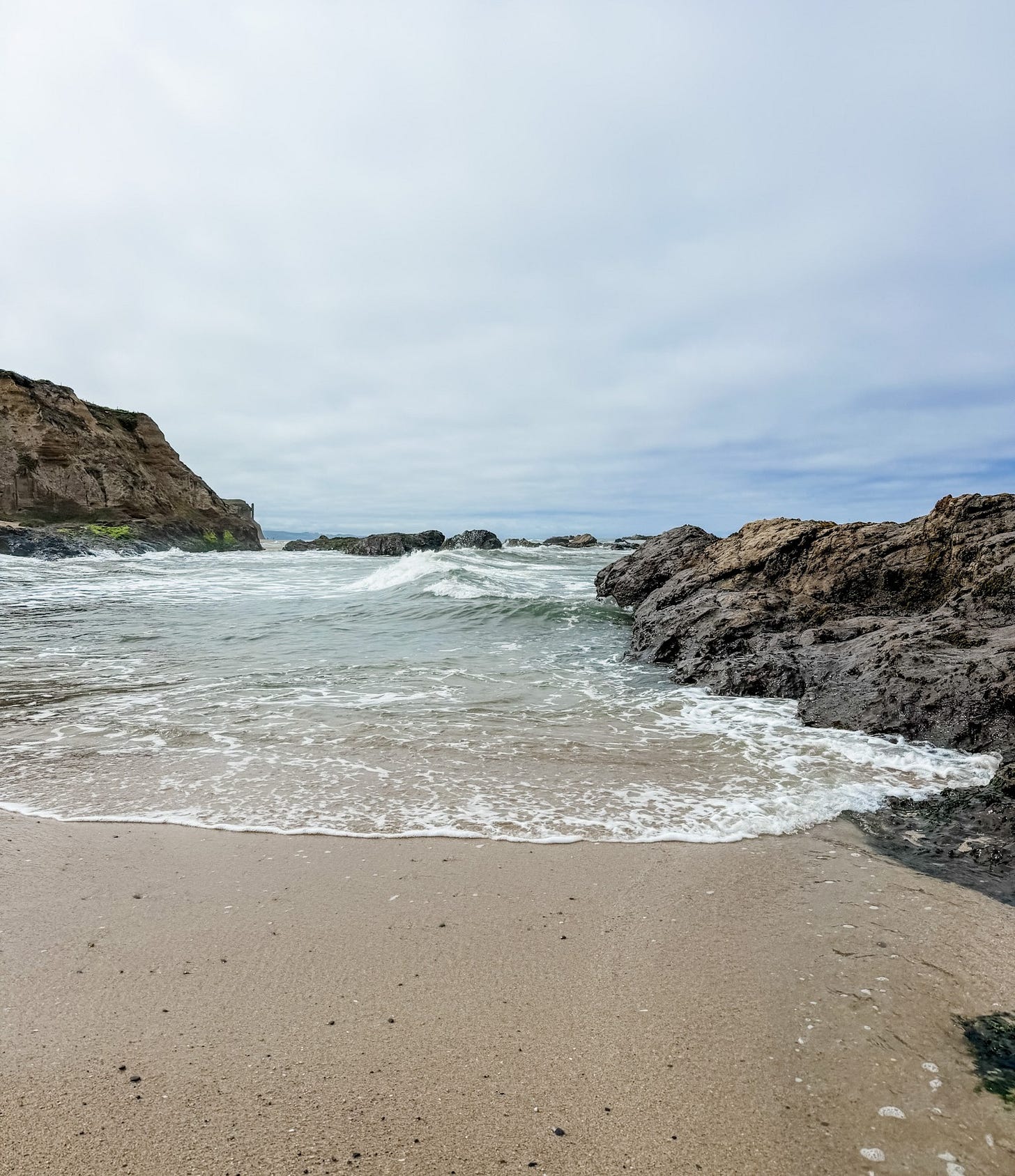

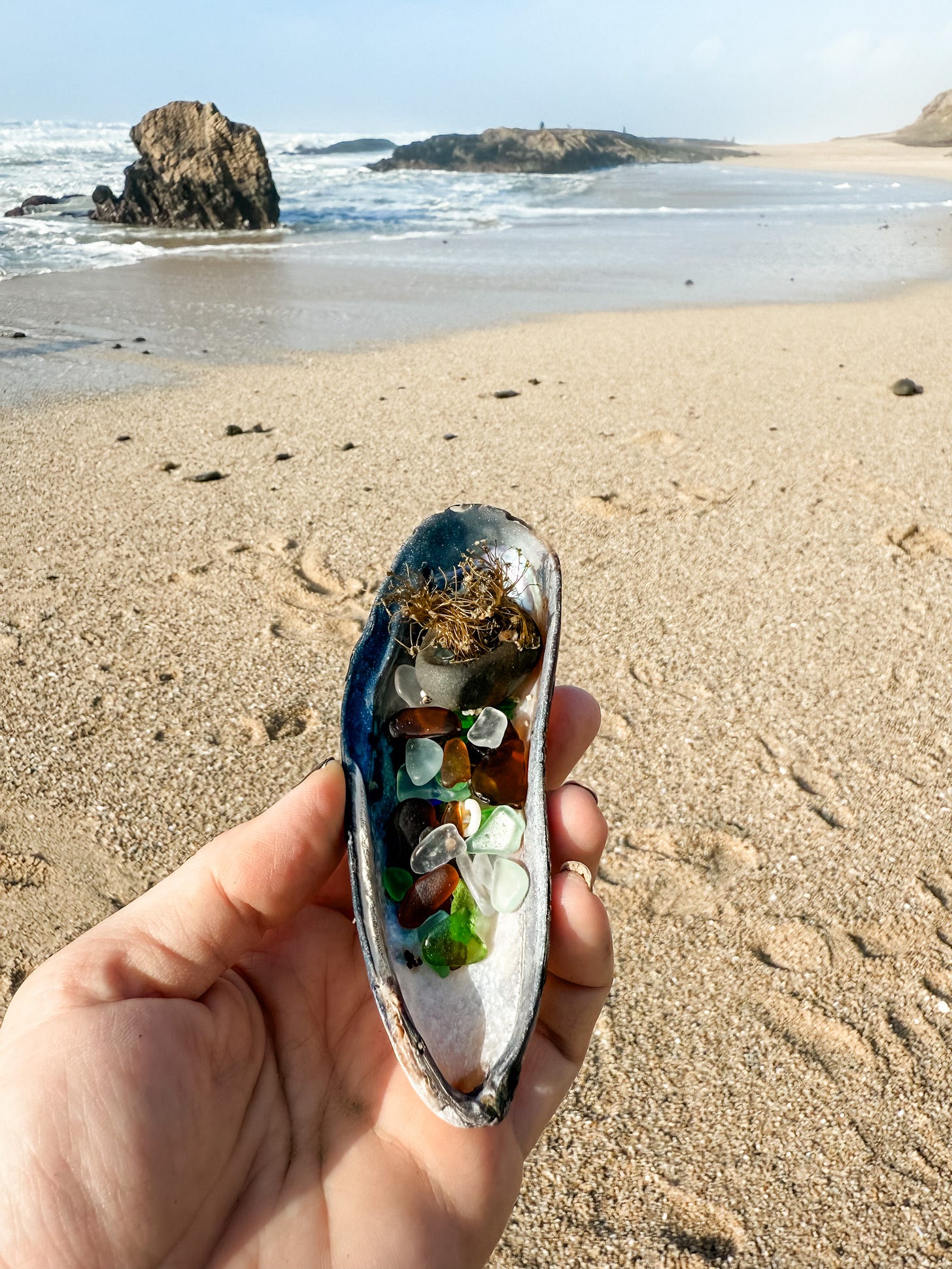
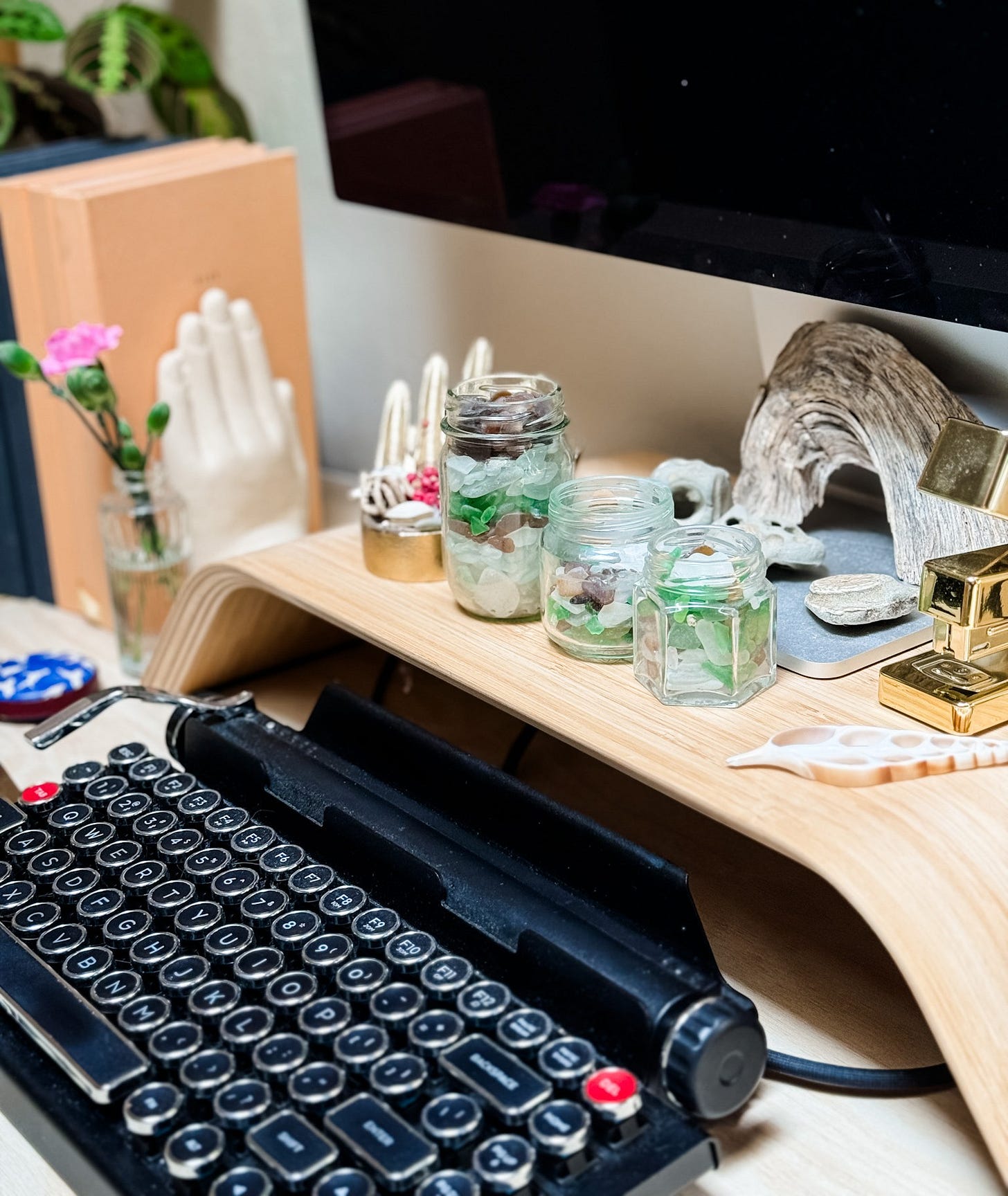
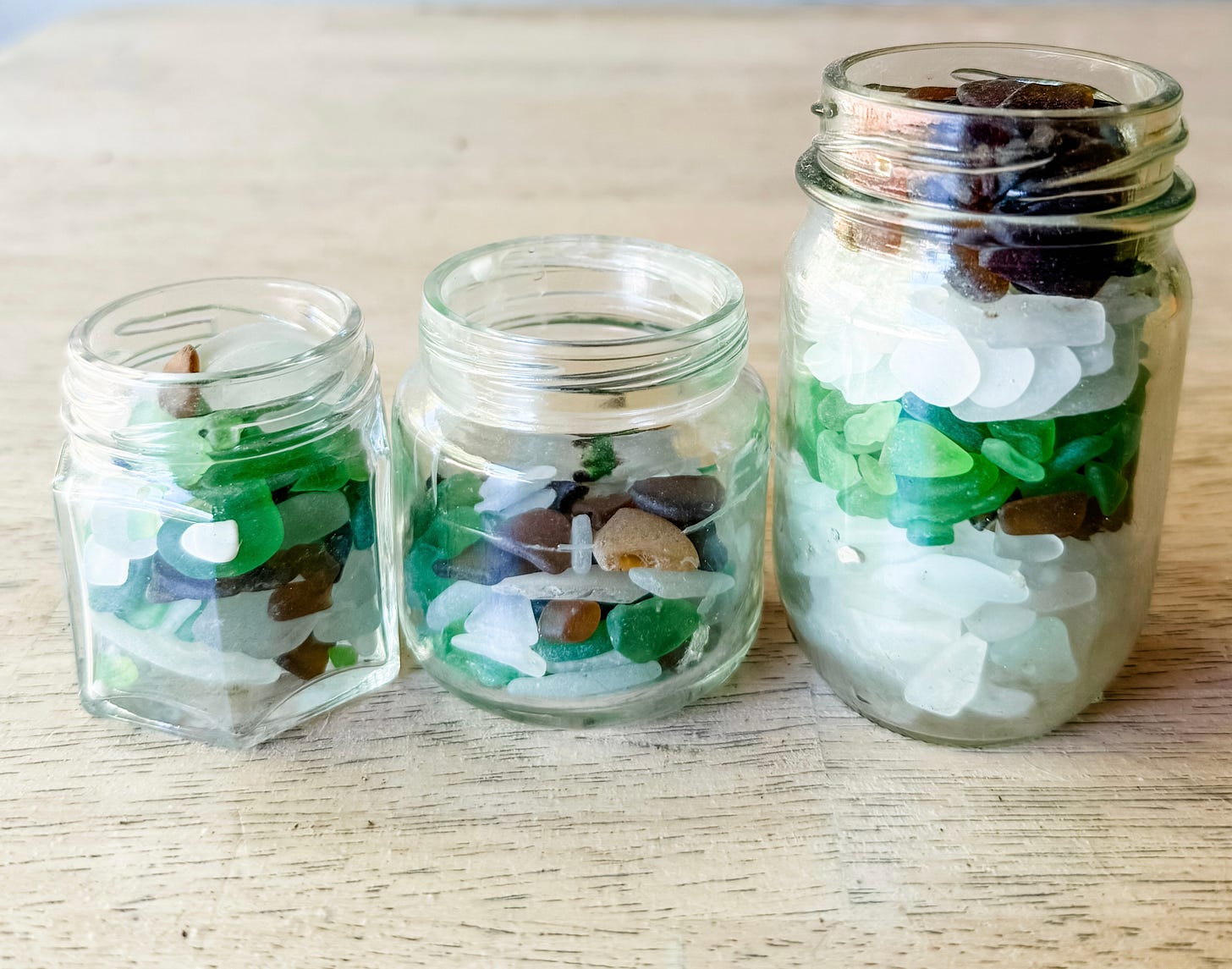


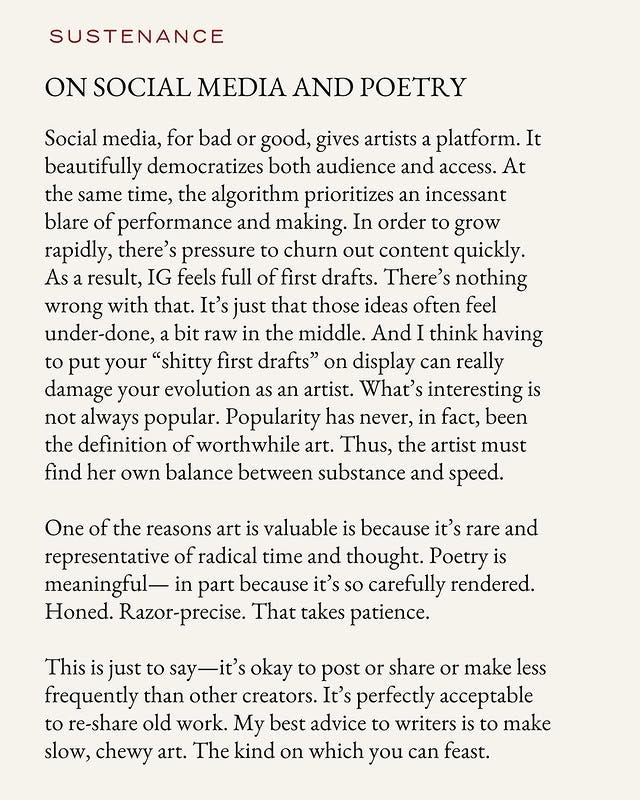
Love this Kristen❣️ What a gift of the spirit patience is...may we all find ways to encourage its lingering.
Sea glass is so deeply metaphorical and has inspired many poems in me, too! <3 this and the practice of burying it in sand in the jar. What a beautiful, wonderful spiritual practice!